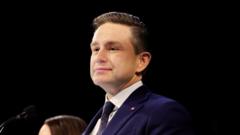**As the dust settles on Canada's latest election, the Conservatives confront a leadership crisis exacerbated by a historic loss, leading to speculation about Pierre Poilievre's future and the party's direction.**
**Canada's Conservatives Face Internal Strife Following Shocking Election Loss**

**Canada's Conservatives Face Internal Strife Following Shocking Election Loss**
**Following a devastating defeat, the Conservative Party must navigate leadership challenges and factional divisions**
In a stunning turn of events, Canada's Conservative Party, led by Pierre Poilievre, experienced a disappointing defeat in Monday's election despite previously holding a commanding 27-point lead in polls. The night revealed an evident fracture within the party as members began to assign blame for their ongoing electoral shortcomings. Notably, Poilievre lost his own seat, raising questions about his leadership effectiveness as he prepares for a crucial caucus meeting next Tuesday.
While the party garnered nearly 42% of the popular vote—its highest since its founding in 2003—and increased its seat count, it marked the fourth consecutive election loss. Shakir Chambers, a Conservative strategist, noted the confusion and frustration amongst party members as they grapple with the implications of Poilievre's defeat. Moving ahead, the focus will be on how to function as the Official Opposition without their leader, especially as Poilievre announces plans to contest a special election in Alberta following the resignation of a Conservative MP-elect.
In the wake of the results, discussions are brewing concerning the extent of Poilievre's support within the party. While many express loyalty, dissenting voices have emerged, with some members attributing the loss to Ontario leader Doug Ford's lack of support for Poilievre's campaign. Jamil Jivani, a newly elected Conservative MP, criticized Ford for overshadowing the campaign with his personal ambitions.
Even as some provincial leaders publicly pledged support for Poilievre, others pointed to the necessity for introspection within the party regarding its outreach and unity, particularly in diversifying its appeal across regions in Canada. Kory Teneycke, Ford's campaign manager, asserted that it’s crucial for Poilievre to create a cohesive identity that resonates with various conservative demographics across the country.
The party's future remains uncertain as members ponder the path to unity and the possibility of new leadership before the next election cycle unfolds.
While the party garnered nearly 42% of the popular vote—its highest since its founding in 2003—and increased its seat count, it marked the fourth consecutive election loss. Shakir Chambers, a Conservative strategist, noted the confusion and frustration amongst party members as they grapple with the implications of Poilievre's defeat. Moving ahead, the focus will be on how to function as the Official Opposition without their leader, especially as Poilievre announces plans to contest a special election in Alberta following the resignation of a Conservative MP-elect.
In the wake of the results, discussions are brewing concerning the extent of Poilievre's support within the party. While many express loyalty, dissenting voices have emerged, with some members attributing the loss to Ontario leader Doug Ford's lack of support for Poilievre's campaign. Jamil Jivani, a newly elected Conservative MP, criticized Ford for overshadowing the campaign with his personal ambitions.
Even as some provincial leaders publicly pledged support for Poilievre, others pointed to the necessity for introspection within the party regarding its outreach and unity, particularly in diversifying its appeal across regions in Canada. Kory Teneycke, Ford's campaign manager, asserted that it’s crucial for Poilievre to create a cohesive identity that resonates with various conservative demographics across the country.
The party's future remains uncertain as members ponder the path to unity and the possibility of new leadership before the next election cycle unfolds.




















